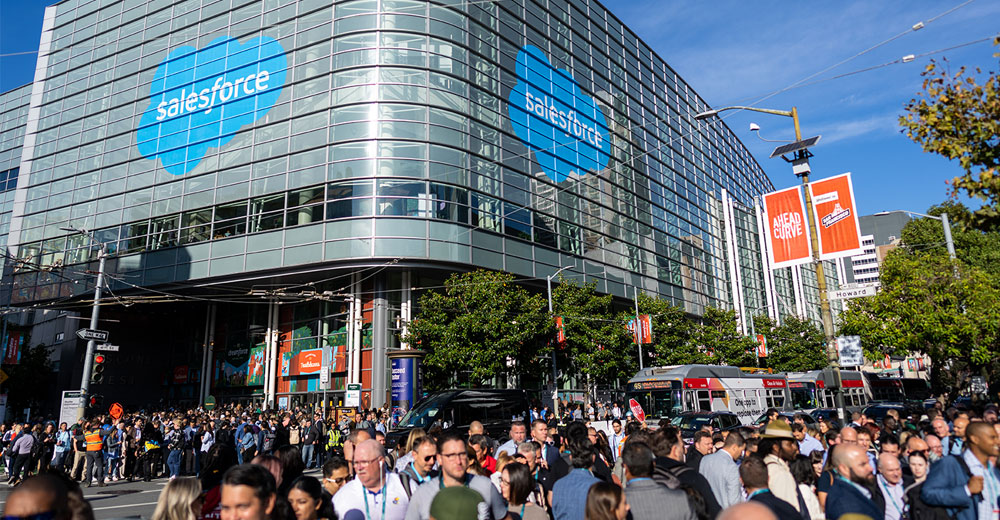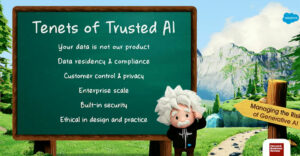Salesforce tees up Dreamforce 2023 in San Francisco next week. While it’s a reincarnation of past events that took place without facemasks, much has changed in the last few years, both for the company and almost everything else in our culture. Some good, some not so much.
San Francisco could really benefit from all the tourist dollars the event brings, and many hope that the event will be the beginning of a San Francisco renaissance. While I don’t live there, San Francisco has been my home away from home for over 25 years, so I am rooting for a big success.
Some of the innovations Salesforce helped to midwife so that we could all work at home during the pandemic have kept downtown office towers in San Francisco and elsewhere from becoming fully occupied during the last couple of years. But return to office has become a loud meme these days in part because of all the commercial real estate sitting empty.
Nonetheless, working from home is real, its impact is significant, and perhaps working with AI will be another drag on commercial real estate. Everyone I talk to is a little nervous about being displaced by a handful of algorithms. Can’t blame them.
Speaking of AI, it’s interesting that Salesforce’s approach to AI-everything is notably less wild-eyed than its embrace of social media many years ago. The company did well to protect itself from most of social’s excesses, but because of social, I think today’s approach to incorporating AI is more considered.
Salesforce has prudently built its values, with trust first and foremost, into its solutions, and you can expect to hear a good deal about their approach in the keynotes and product intros at Dreamforce.
AI the Protector
Not surprisingly, one area not getting much attention, but which is critical, is how the company uses AI to protect itself and its users. That’s largely the province of Silvio Savarese, executive vice president and chief scientist for Salesforce AI.
Savarese’s team is responsible for operationalizing the AI Trust Layer for people and products. I expect we’ll hear much about how Salesforce uses AI to keep the lights on and ward off bad guys during Dreamforce.
For a long time, all we could do to defend data centers was to build walls around them and encourage customers, as Oracle did, to apply system patches when they came out, not a year later. Oracle’s newest database technologies, like self-patching, have been a significant improvement, leading to reduced hacking.
However, hacking still goes on. Just a week ago, we learned that the Chinese had hacked Commerce Secretary Gina Raimondo’s email in advance of her meetings with Chinese leaders. More than ever, we need vigilance against intrusion, and AI seems like a good way to get it on the cheap.
I know Oracle is not resting on its security laurels, and Salesforce is no different. The use of AI promises to make it easier to eradicate intruders’ root, branch, and stem, and I, for one, am eager to see what Salesforce will have to say next week when it further elaborates on its trust mission in the age of AI.
Bridging the Gap Between Technology and Trust
Meanwhile, we can reasonably expect to see AI all over everything at Dreamforce. It might be interesting to see how they can improve sales and service systems that already offer a good amount of expertise and advice.
Salesforce is not only aware of this, as the company’s recent State of the Connected Customer report says, “As brands increasingly adopt AI to increase efficiency and meet increasing customer expectations, nearly three quarters (73%) of their customers are concerned about unethical use of the technology.”
Seems like an echo of social to me.
Moreover, those numbers seem to be going in the wrong direction. The same report from 2022 said that 82% of business buyers and 65% of consumers were open to using AI to improve their experiences.
That’s not the end of the world since numbers like this may only reflect product unfamiliarity and the approach of implementation and not a change of heart on anyone’s part.
The solution isn’t more technology, and Salesforce understands this. Dreamforce has always been about the people element (machines don’t dream, not yet, at least).
Landing this plane will require companies to implement ethical guidelines and offer better visibility as the technology is brought online. So, I think one of the key jobs of all personnel at Dreamforce will be selling AI generically as something good long before discussing specific products.
There will, of course, be many product intros at the show. I like to write pieces like this speculatively to not violate any NDAs. My briefing comes later this week. Yours will be at Dreamforce.


























































